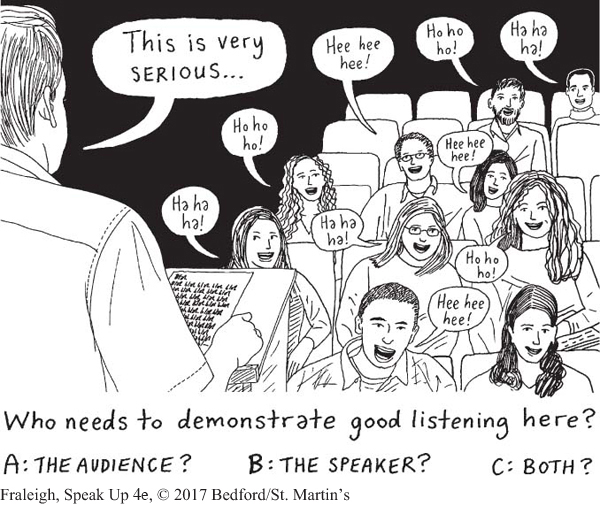Chapter 4 LISTENING SKILLS

Look for the  and
and  throughout the chapter for adaptive quizzing and online video activities.
throughout the chapter for adaptive quizzing and online video activities.
Page 91
“Listening is a vital skill in public speaking and beyond.”
Jason was psyched. While preparing an informative speech on the ways young people use the Internet, he focused on the popularity of Twitter. An active Twitter user, Jason found the topic fascinating and looked forward to developing the speech. To learn more about the habits of other students using Twitter, he conducted six face-
With time running out, Jason finished developing his presentation using the few insights he could pull from his notes. On the day of his speech, Jason proudly presented his claims about young people’s use of Twitter—
Page 92
Jason’s unpleasant experience reveals the importance of listening in public speaking. Unfortunately for him, he missed two major opportunities to listen. First, when he was interviewing his classmates, he failed to pay enough attention to take comprehensive notes. This lack of attention was confirmed later, when he couldn’t recall details from the interviews. Second, Jason failed to listen to his audience as he was delivering his speech. If he had focused on his classmates while he was talking, he may have detected both auditory and visual signs that they disagreed with his claims (eye rolls, head shakes, and muttered comments such as “Seriously?”). By not listening carefully while researching and delivering his speech, Jason never connected with his audience members and lost credibility with them.
As Jason’s story reveals, listening is a vital skill for public speakers at all stages of the speech preparation process. Yet many novice speakers find this idea surprising. After all, it’s the audience who has to listen, right? To be sure, audiences can be good listeners by respectfully and carefully attending to the speaker’s message, but speakers have many opportunities to practice good listening skills while preparing and delivering a presentation. Think about it: You interview people to research your speech. You practice your presentation in front of trusted friends or family members and listen to their feedback. And you deliver your speech, paying attention to your audience’s responses to decide whether you need to adjust your voice, volume, pacing, or some other aspect of your delivery. By failing to listen at any of these stages, you risk ignoring important information that you need to present the most effective speech possible.
If you’re not particularly skilled at listening, you’re not alone: many people have a similar difficulty. Yet you can learn how to strengthen your listening skills, and this chapter offers helpful guidelines. In the pages that follow, we explore the importance of listening in public speaking, examine the process of listening, and then consider the causes behind ineffective listening behaviors. We also offer suggestions for effective listening that you can put into practice as both a speaker and an audience member.
Page 93
